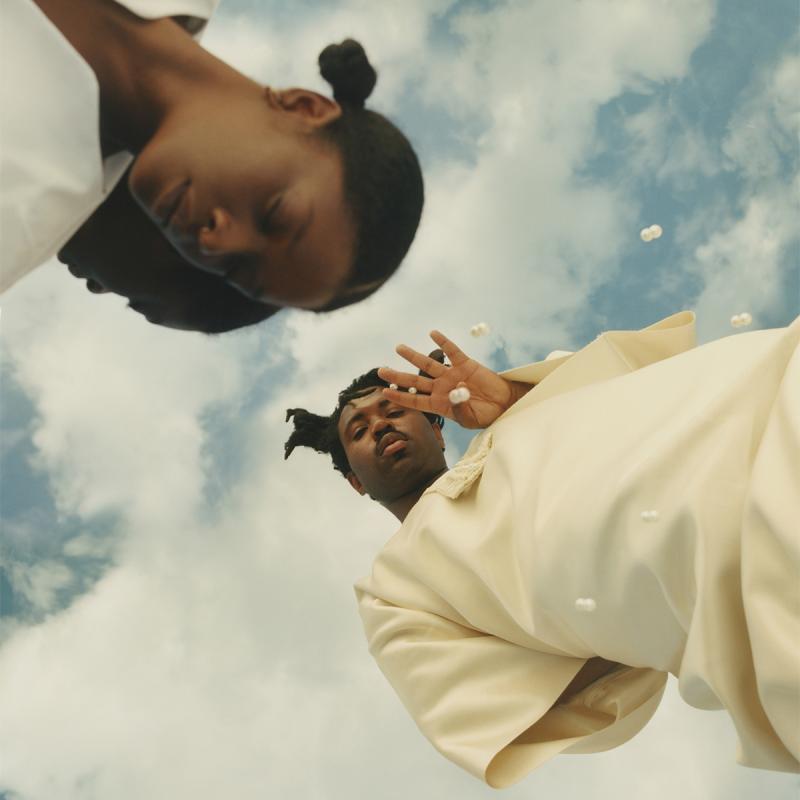Album: Sampha - Lahai | reviews, news & interviews
Album: Sampha - Lahai
Album: Sampha - Lahai
Sampha follows up his Mercury Prize winning debut with an ambitious, remarkable album

In 2011 the BBC aired Wonders of the Universe, a documentary presented by physicist Brian Cox about the origins of the universe divided into four parts: “Destiny”, “Stardust”, “Falling” and “Messengers”. These episodes could easily have been titles of songs on Sampha’s remarkable new album, Lahai, which is similarly concerned with the cosmos – but in a deeply personal way.
Since emerging from London’s left-field indie electronic scene in the 2010s, Sampha has become a sought-after collaborator. It’s as if his emotionally baring lyrics and bruised falsetto grants access to buried emotions for whoever he works with, whether that’s Drake, Kanye West, Solange or FKA Twigs. In 2017 he decided to step into the spotlight with his debut Process, a cathartic, introspective collection of songs framed by the death of his mother in 2015.
On Lahai, Sampha returns to delve into a similarly complicated topic: the cosmic passing of time and our inability to control it. In the BBC documentary (that Sampha has said was important for the album) Cox discusses entropy, and how this in theory makes time-travel backwards impossible. The concept haunts Sampha and on “Can’t Go Back” the phrase is interjected repeatedly over an agitated beat. He understands that “time will catch you”, as he sings on “Spirit 2.0”. But this knowledge of mortality coexists with something more hopeful: “Maybe there’s no ends, maybe just infinity” he sings on “Satellite Business”, as arpeggios from a retro-synth twinkle like stars.
Just as Process offered music as catharsis for grief, on Lahai, music acts as a respite from these cosmic truths. Here Sampha travels through space and time with ease. Here the skittery snares of Nineties jungle and IDM merge with elegant arrangements evoking the classical minimalism of Steve Reich. There are funky basslines, spoken word interludes in French and Korean, glitchy electronics and textures of West African Wassoulou – all held together by his beloved piano.
While loss lingers on the periphery, there is an intoxicating, wide-eyed, vivaciousness to Lahai. The scope may feel impossibly large, but at only 38 minutes, Sampha bends time and space to fit a lifetime of ideas into 14 songs. It’s nothing short of a miracle.
rating
Share this article
The future of Arts Journalism
You can stop theartsdesk.com closing!
We urgently need financing to survive. Our fundraising drive has thus far raised £49,000 but we need to reach £100,000 or we will be forced to close. Please contribute here: https://gofund.me/c3f6033d
And if you can forward this information to anyone who might assist, we’d be grateful.

Subscribe to theartsdesk.com
Thank you for continuing to read our work on theartsdesk.com. For unlimited access to every article in its entirety, including our archive of more than 15,000 pieces, we're asking for £5 per month or £40 per year. We feel it's a very good deal, and hope you do too.
To take a subscription now simply click here.
And if you're looking for that extra gift for a friend or family member, why not treat them to a theartsdesk.com gift subscription?
more New music
 Music Reissues Weekly: Robyn - Robyn 20th-Anniversary Edition
Landmark Swedish pop album hits shops one more time
Music Reissues Weekly: Robyn - Robyn 20th-Anniversary Edition
Landmark Swedish pop album hits shops one more time
 Album: Twenty One Pilots - Breach
Ohio mainstream superstar duo wrap up their 10 year narrative
Album: Twenty One Pilots - Breach
Ohio mainstream superstar duo wrap up their 10 year narrative
 Album: Ed Sheeran - Play
A mound of ear displeasure to add to the global superstar's already gigantic stockpile
Album: Ed Sheeran - Play
A mound of ear displeasure to add to the global superstar's already gigantic stockpile
 Album: Motion City Soundtrack - The Same Old Wasted Wonderful World
A solid return for the emo veterans
Album: Motion City Soundtrack - The Same Old Wasted Wonderful World
A solid return for the emo veterans
 Album: Baxter Dury - Allbarone
The don diversifies into disco
Album: Baxter Dury - Allbarone
The don diversifies into disco
 Album: Yasmine Hamdan - I Remember I Forget بنسى وبتذكر
Paris-based Lebanese electronica stylist reacts to current-day world affairs
Album: Yasmine Hamdan - I Remember I Forget بنسى وبتذكر
Paris-based Lebanese electronica stylist reacts to current-day world affairs
 theartsdesk on Vinyl 92: Marianne Faithful, Crayola Lectern, UK Subs, Black Lips, Stax, Dennis Bovell and more
The biggest, best record reviews in the known universe
theartsdesk on Vinyl 92: Marianne Faithful, Crayola Lectern, UK Subs, Black Lips, Stax, Dennis Bovell and more
The biggest, best record reviews in the known universe
 Blondshell, Queen Margaret Union, Glasgow review - woozy rock with an air of nonchalance
The singer's set dripped with cool, if not always individuality
Blondshell, Queen Margaret Union, Glasgow review - woozy rock with an air of nonchalance
The singer's set dripped with cool, if not always individuality
 Music Reissues Weekly: Chiswick Records 1975-1982 - Seven Years at 45 RPM
Triple-album 50th-anniversary celebration of the mould-breaking British independent label
Music Reissues Weekly: Chiswick Records 1975-1982 - Seven Years at 45 RPM
Triple-album 50th-anniversary celebration of the mould-breaking British independent label
 Album: Josh Ritter - I Believe in You, My Honeydew
The alt-country singer's latest isn't consistent but does hit highs
Album: Josh Ritter - I Believe in You, My Honeydew
The alt-country singer's latest isn't consistent but does hit highs
 Album: David Byrne - Who is the Sky?
Born to be weird
Album: David Byrne - Who is the Sky?
Born to be weird

Add comment